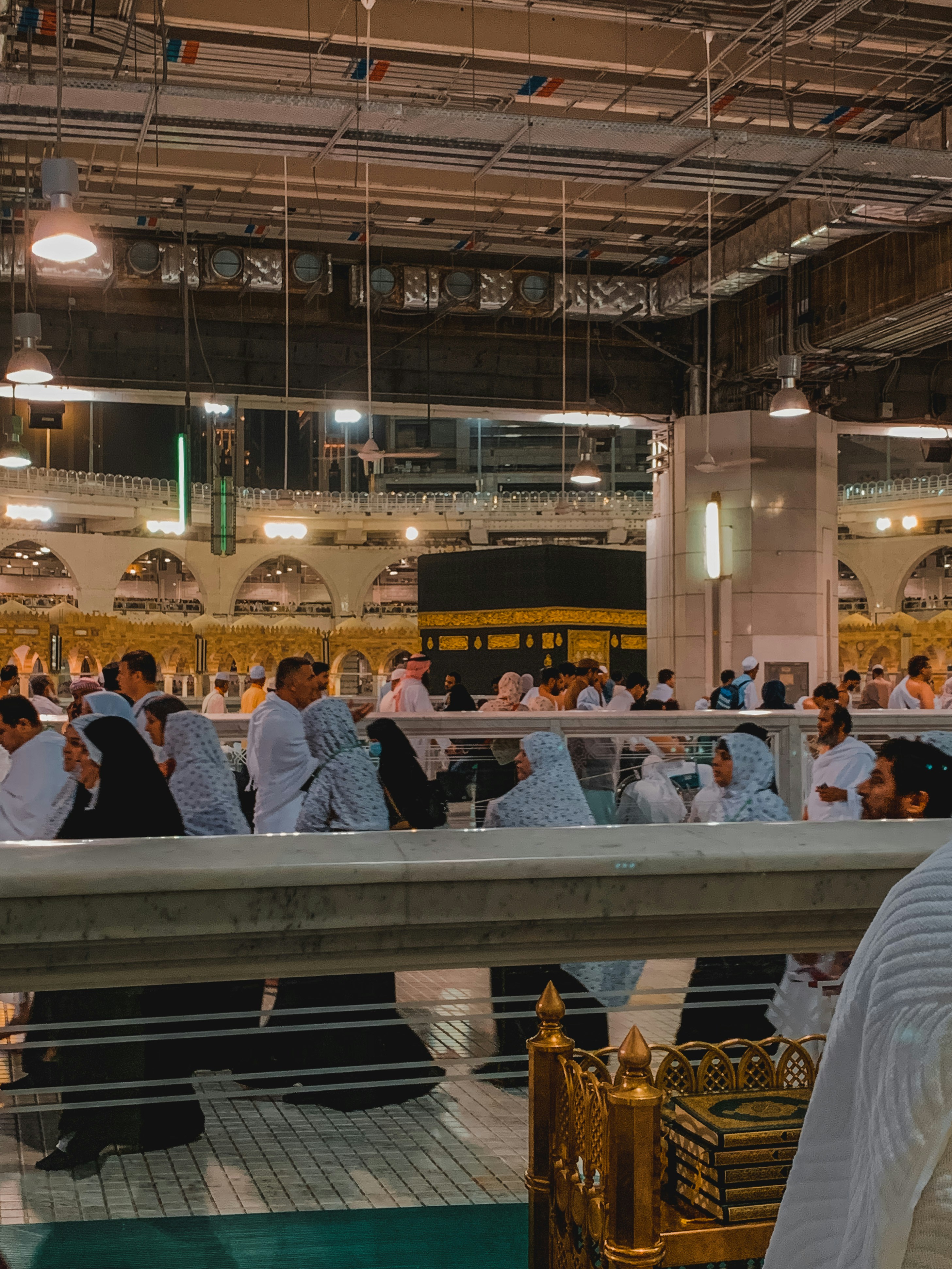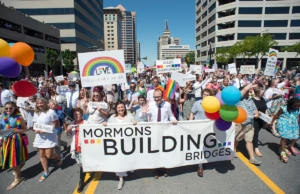A Resurgence of Faith: How Men’s Spiritual Awakening is Altering the Religious Gender Gap
Introduction: Understanding the Religious Gender Gap
The religious gender gap, a notable phenomenon observed in numerous faith communities, refers to the difference in levels of participation and engagement in religious practices between men and women. Historically, women have consistently demonstrated higher engagement in religious activities, such as attending services, participating in community outreach, and taking on leadership roles within spiritual organizations. This disparity raises important questions about the underlying factors that contribute to differing levels of spiritual involvement.
The roots of the religious gender gap can be traced back to a combination of sociocultural, psychological, and theological influences. The traditional roles assigned to men and women within various cultures often dictate their involvement in faith-related practices. For instance, many societies hold specific expectations regarding masculinity that may discourage men from expressing vulnerability, which is sometimes associated with spiritual exploration. Additionally, the narrative surrounding spirituality and religion has often been shaped by predominantly male perspectives, further complicating men’s engagement with faith communities.
The implications of this gender gap are far-reaching, affecting not only the dynamics within religious institutions but also the wider societal context. When men are less engaged in religious practices, it can lead to a diminishment of their influence in community moral frameworks and spiritual leadership. This disengagement may perpetuate cycles of disconnection from faith, thereby alienating an essential demographic within religious ecosystems. However, recent trends suggest a compelling transformation; emerging evidence indicates that men are experiencing a spiritual awakening, thereby challenging long-held stereotypes and potentially reshaping the landscape of religious participation.
The exploration of these trends reveals an intriguing narrative of change, inviting an examination of how this resurgence of faith among men is influencing the religious gender gap. This blog post delves into the complex interplay between gender and spirituality as society navigates this evolving landscape.
The Historical Context of Men’s Spirituality
The evolution of men’s spirituality is deeply rooted in historical perspectives that reflect societal roles, cultural expectations, and patriarchal influences. Traditionally, men’s engagement in religious practices has been framed through the lens of authority and power. From ancient civilizations, wherein priesthoods were predominantly occupied by men, to the modern era, where many religious leadership roles continue to be male-dominated, a pattern emerges illustrating how these structures have shaped men’s spirituality.
Throughout history, men have often been viewed as the protectors and providers, leading to a specific delineation of their spiritual roles that were often tied more to duty than to personal exploration. This alignment with societal expectations has frequently left little room for emotional or vulnerable expressions of faith. Men’s spirituality has thus tended to reflect attributes associated with strength, control, and discipline, often neglecting the more nurturing and emotional facets typically valued in women’s spiritual engagement.
Moreover, the impact of patriarchy has been profound. In many cultures, male-dominated doctrines and teachings reinforced the idea that spirituality was largely a masculine pursuit, relegating women’s spiritual experiences to secondary status. Such frameworks not only marginalized women’s religious contributions but also constricted men’s spirituality to a rigid set of beliefs and practices. This historical context has undoubtedly contributed to a significant gender gap in faith, as men have been socialized to conform to predefined roles rather than explore diverse expressions of spirituality.
As we analyze these historical trends, it is clear that societal norms and cultural expectations greatly influenced men’s spirituality and shaped the dynamics of religious practice. Recognizing these influences is essential for understanding the current resurgence of men’s spiritual awakening and its potential to bridge the existing religious gender gap.
Recent Trends: A Shift in Men’s Religious Engagement
Recent analyses indicate a noteworthy change in men’s religious involvement across various demographics. Studies conducted over the last few years show a gradual uptick in participation among men in spiritual practices and faith-based activities. This shift seems to be driven by several factors, including changing societal norms and the emergence of inclusive faith movements that resonate with men’s experiences and needs.
The Pew Research Center reported that, between 2019 and 2023, there has been a notable increase in weekly religious service attendance among men under 50. In particular, this demographic experienced a rise of approximately 15% in reported attendance, highlighting an evolving landscape in which younger men are seeking spiritual community and purpose. Furthermore, men are becoming more involved in church programs focused on personal growth, mental health, and male bonding—elements that address modern challenges and foster a sense of belonging.
Moreover, demographic shifts such as an increase in diverse religious affiliations are contributing to this trend. Many men are gravitating towards faith movements that emphasize solidarity, brotherhood, and mentorship. For instance, organizations that focus on spiritual masculinity are attracting men who are eager to explore their faith in a supportive environment, free from traditional stereotypes of masculinity that may have previously deterred them from religious participation.
In addition to traditional religious institutions, alternative spiritual practices, like mindfulness and meditation, have emerged as avenues through which men engage with their spirituality. This broadening of options allows for a personal and often less formal approach to faith that resonates with contemporary sensibilities. These trends collectively indicate a resurgence of men’s engagement in spiritual matters, challenging the long-held perception of a religious gender gap and paving the way for a more inclusive dialogue about faith in society.
Factors Behind the Resurgence of Faith Among Men
The resurgence of faith among men can be attributed to a variety of interrelated factors that have catalyzed a deeper search for spiritual meaning. One prominent influence is the occurrence of personal crises, which often propel individuals to reevaluate their life choices and spiritual beliefs. For many men, moments of significant challenge—whether it be in the form of career setbacks, relationship breakdowns, or existential doubts—serve as catalysts for seeking solace and understanding through faith. This introspection can lead to a rekindled commitment to spirituality, as they look for answers and guidance.
Moreover, the growth of community-building opportunities has played a pivotal role in this spiritual revival. Men’s ministries and faith-based groups have emerged as critical platforms, fostering environments where men can gather, share experiences, and foster connections. These settings provide a judgment-free space to discuss faith-related topics, enabling men to engage more deeply with their spirituality. The sense of belonging and support found in such communities is vital, as it counteracts feelings of isolation and reinforces the value of spiritual exploration.
Additionally, the influence of technology cannot be understated. The proliferation of social media, podcasts, and online spiritual resources has made faith more accessible than ever. Many men are discovering and participating in new spiritual practices from the comfort of their homes, allowing them to explore diverse perspectives without the constraints of traditional settings. These digital platforms offer interactive experiences and conversations that resonate with men, encouraging them to reflect on their beliefs and share their journeys with a broader audience. This shift signifies a modernization of faith engagement, inviting men to explore religious expressions that align closely with their evolving identities.
The Role of Community in Men’s Spiritual Awakening
Community serves as a fundamental pillar in the spiritual awakening of men, creating environments where faith can flourish and evolve. As men increasingly seek deeper connections with their spirituality, the roles that social networks play become ever more prominent. Through support systems, group activities, and fellowship opportunities, men are encouraged to engage with their faith in meaningful ways. This engagement not only nurtures their own spiritual journeys but also fosters a collective exploration of spirituality within male groups.
Support networks can manifest in various forms, from church-based men’s groups to secular organizations that promote spirituality without a strict religious affiliation. For instance, numerous churches have initiated “Men’s Fellowships” where participants come together to discuss spiritual matters, share personal experiences, and provide mutual support. These gatherings create safe spaces where men can express doubts and seek guidance, promoting spiritual growth while reducing feelings of isolation.
Group activities such as retreats, workshops, and service projects also play a significant role in strengthening bonds among men. Engaging in shared experiences fosters camaraderie and encourages participants to deepen their faith. Such activities not only enhance personal spiritual development, but they also reinforce a sense of purpose and belonging within the community. For example, men’s retreats often provide structured programs focusing on themes of leadership and vulnerability, prompting members to reflect on their spiritual lives and encouraging open discussions among peers.
The impact of fellowship opportunities is further evidenced in the success of specific organizations that cater to men seeking spiritual growth. Groups like “Men’s Ministry” across various faiths and independent movements often report increased participation as more men seek community support in their spiritual journeys. These successful models exemplify the importance of community in men’s spiritual awakening, illustrating how connectedness and shared experiences can inspire meaningful transformations in their faith.
Challenges Men Face in Reconnecting with Faith
The journey of spiritual awakening for men is often accompanied by a myriad of challenges that can impede their reconnection with faith. One prominent obstacle is the societal stigma surrounding expressions of spirituality and vulnerability. Traditionally, many cultures have promoted a stoic image of masculinity, which emphasizes emotional restraint and strength. This societal expectation can create significant pressure on men, leading them to suppress their spiritual yearnings in favor of conforming to these rigid definitions of masculinity. As a result, the fear of judgment from peers or family can deter men from seeking spiritual growth.
Additionally, personal doubts can play a substantial role in the spiritual journeys of men. Many individuals grapple with questions regarding the existence of a higher power, the relevance of religious teachings, and the values upheld therein. Such uncertainties can foster a sense of disillusionment that may lead to estrangement from faith practices. Men, in particular, may struggle with these doubts due to the compounded pressure of upholding a strong, decisive persona, thereby creating a barrier to engaging in open discussions or explorations of their spiritual struggles.
The balance between traditional masculinity and vulnerability also presents a unique challenge. Many men find themselves torn between the desire to engage authentically in their spiritual pursuits and the ingrained belief that vulnerability is a sign of weakness. This internal conflict can stifle genuine exploration of faith, creating hesitation to participate in community worship or seek spiritual guidance. The juxtaposition of wanting to connect deeply with spirituality while feeling constrained by societal norms is an ongoing struggle for numerous men navigating their paths toward faith.
Cultural Implications of an Increasingly Faithful Male Population
The increasing engagement of men with their faith is reshaping cultural dynamics across various spheres of life. As more men embark on spiritual journeys, it is imperative to examine the potential influences on family dynamics, community involvement, and societal perceptions of masculinity and spirituality. This phenomenon may lead to a nurturing environment where spiritual exploration becomes a collective family undertaking, strengthening familial bonds and encouraging deeper connections among family members.
Traditionally, spiritual practices have often been seen as a predominantly female pursuit. However, as more men embrace their faith, it is redefining roles within family structures. For instance, fathers who actively participate in religious activities can instill values of compassion, respect, and accountability among their children, fostering a robust moral foundation. This shift encourages families to engage in conversations surrounding faith, thereby allowing young boys to witness diverse models of masculinity that include emotional openness and vulnerability.
Moreover, increased male participation in faith communities can revolutionize community involvement. Men engaging with spirituality may also lead to greater volunteerism and charitable efforts. This collective action could address local issues, enhancing social cohesion within neighborhoods. Communities that promote inclusivity and active male participation can cultivate environments that challenge stereotypes of masculinity, moving away from the archetype of emotional stoicism towards one that embraces empathy and communal responsibility.
As societal norms regarding masculinity and spirituality evolve, the notion of being spiritually inclined is increasingly detached from stigma. This renaissance could inspire a multitude of men to explore their beliefs without fear of being perceived as less masculine. In turn, the transition promotes a broader understanding of spirituality, establishing a more inclusive dialogue about faith that encompasses various expressions of masculinity. This nuanced interaction between faith and male identity suggests a cultural transformation that may redefine how men relate to both their spirituality and the communities in which they reside.
Case Studies: Stories of Transformation and Faith
The resurgence of faith among men has manifested in remarkable personal stories that highlight transformative experiences and renewed commitments. One such case is that of John, a 42-year-old corporate executive who, after years of pursuing material success, found himself spiritually unfulfilled. A chance encounter with a community service program prompted John to reevaluate his values and priorities. He began attending a local men’s group, where he engaged in discussions about spirituality and personal growth. John’s journey led him to accept a more profound sense of purpose centered on service and connection, resulting in a significant shift in his lifestyle and mindset.
Another compelling story is that of Mark, a former military veteran who faced challenges with post-traumatic stress disorder (PTSD). Struggling to find solace and meaning, Mark turned to a faith-based rehabilitation program that focused on spiritual healing. Through this program, he not only rediscovered his faith but also built a network of supportive relationships with fellow men experiencing similar struggles. This communal aspect helped him heal emotionally and spiritually. Mark’s renewed commitment to his faith has since inspired him to become an advocate for mental health awareness in the religious community.
Similarly, David, a teenage boy from a fractured family background, experienced a radical change after joining a youth mentorship program at his local church. Through weekly meetings and group activities, David found camaraderie and support that encouraged him to explore his spirituality. His mentors helped him build self-esteem and resilience, allowing him to develop a clearer understanding of his values and beliefs. Today, he is not only a committed member of his church but also a role model for other youth in his community.
These case studies illustrate the profound impact that personal transformation through faith can have on men’s lives. As they navigate their journeys of spiritual awakening, their stories reinforce the importance of faith in fostering community, resilience, and purpose.
Looking Ahead: The Future of Men’s Faith Engagement
As we examine the future of men’s engagement in faith, it becomes evident that there are several key areas poised for growth. One significant trend is the increasing interest among men in seeking spirituality that resonates with their personal experiences and life challenges. This shift is not merely about attending services but encompasses a deeper exploration of faith that is both personal and communal. Men’s faith engagement is evolving, reflecting a broader societal change where traditional structures are often questioned, and new forms of spiritual expression are being embraced.
Technology will undoubtedly play a pivotal role in shaping this evolution. Online platforms for spiritual gatherings and discussions are emerging, providing spaces where men can connect and share their spiritual journeys. Social media, podcasts, and virtual communities are becoming avenues for enlightenment, enabling men to engage with faith in flexible and accessible ways. These digital resources cater to the needs of those who may not feel comfortable or welcome in conventional religious settings, thus lowering barriers to entry for spiritual exploration. Consequently, technology can enhance men’s faith engagement, fostering a community that transcends geographical limitations.
Furthermore, faith communities will need to adapt to support the evolving needs of men seeking spiritual fulfillment. This may involve creating programs and initiatives specifically designed for men, emphasizing mentorship, fellowship, and discussion around contemporary issues. Events that focus on personal growth, emotional health, and shared experiences can resonate well with men and provide them with valuable tools for spiritual development.
In essence, the future of men’s faith engagement is marked by a significant transformation, driven by a desire for deeper understanding and connection. As faith traditions continue to evolve, the integration of technology and adaptive community structures will likely facilitate a richer and more inclusive spiritual environment for men.













Leave a Reply
You must be logged in to post a comment.